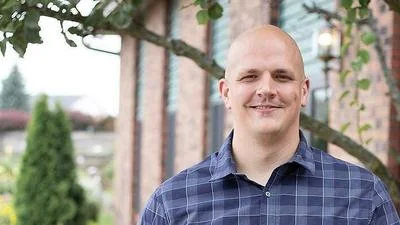The healthcare sector is one of the fastest-growing industries. As a result, knowing how to prepare for an interview in this space is essential. Whether you’re a student looking into online healthcare degrees or a professional looking for a career change, there are some common lines of questioning you can expect from a job interview. To develop potential answers, here’s what you need to know about each question.
1. "Tell me about yourself."
Admittedly, this is a prompt, not a question. But this traditional go-to conversation starter is asked to help the interviewer understand why you’re a good fit for the position. It can be quite difficult to answer, as it usually requires a thorough explanation with specific examples of experiences and achievements.
How to answer
A hiring manager wants to hear about your strengths and how they align with the job. Therefore, you must highlight specific examples from experiences that illustrate how your skills will benefit the role.
You can keep your answer professional yet personable by:
- Focusing on your passion for healthcare
- Highlighting specific reasons why you’re interested in the healthcare industry
- Using examples of how you have demonstrated healthcare-related skills
Sample answer: "I've always had a calling to help people, which is why I volunteered with a local community clinic in high school. Since then, my commitment to healthcare has only increased as I have worked in various healthcare-related positions within the nonprofit sector. Now that I am looking for another opportunity, I'm excited to explore your organization and how my skills would be a great fit for the role."
2. "Why did you choose to apply?"
Be honest and confident when answering this question to help the hiring manager assess how interested and passionate you are about the organization and role.
Healthcare organizations often attract people who are looking for more than just a job. So, speak to the authentic ways you care about the mission and vision of the company and want to enhance the industry.
How to answer
Demonstrate your knowledge of the healthcare organization by identifying goals you may have in common with the employer. It’s important to be genuine in your responses, so avoid surface-level answers. You can do this by:
- Highlighting qualities of the organization that you value
- Discussing specific reasons why you want to work for this particular employer
- Expressing your passion for healthcare and how it has inspired you to find the right career path.
How to prepare for a successful interview
Even the bravest person can get nervous before an interview! For more tips, read our Interview Guide, which includes additional interview guidance.
3. "What is your biggest strength?"
This healthcare interview question seems simple enough to answer, but it can be deceptively challenging.
First, focus on your professional strengths and attributes — not personal ones. In addition, try to avoid leaning heavily on common strengths within the healthcare community, such as organizational skills and punctuality. These skills are a given within any role in the industry and may not set you apart from other candidates.
How to answer
You want the hiring manager to see you as a qualified healthcare professional who can contribute to the organization. To do this, emphasize strengths that are transferable among healthcare environments.
For example, if you have healthcare experience in clinical settings, highlight how great you are at managing your time and prioritizing projects. You can also discuss healthcare-related skills and qualities such as empathy and problem-solving.
Sample answer: "One of my biggest strengths is my ability to manage time efficiently. I know that healthcare professionals are often required to multitask with tight deadlines, which is why I pride myself on being able to prioritize tasks and complete them promptly."
4. "What is your biggest weakness?"
While there is no exact answer or correct response, it’s crucial to indicate your self-awareness and offer a sincere explanation for what the interviewer may perceive as a potential weakness.
At the same time, you should never leave your answer resolved either. Instead, always end this answer with tangible ways you’re addressing your weaknesses and how you hope to change them in the future.
How to answer
Relate your answer to the industry itself. For example, rather than pointing out a personal weakness, it’s best to focus on healthcare-related weaknesses such as perfectionism and overcommitting, as these can impact healthcare professionals' performance in a high-stress environment.
Another example of a healthcare-related weakness is an inability to multitask well. Healthcare professionals must juggle many tasks at once, and not being able to do so efficiently can lead to errors. If you have healthcare experience in clinical settings, highlight how professionals must focus on patient safety and best practices to keep patients healthy.
Sample answer: "I'm a perfectionist, which affects my ability to delegate tasks and let go. While it’s something that has worked to my advantage at times, I know it can be a weakness as healthcare professionals are required to multitask and prioritize tasks. However, I am working on improving this by utilizing some of my time-management skills I discussed earlier."
5. "How do you see the future of healthcare?"
This healthcare interview question aims to identify how you can contribute to an organization and connect your healthcare career goals with the organization's objectives. You can choose to discuss innovations or industry challenges. However, it’s important to select one and stay away from discussing both simultaneously.
How to answer
First, research the company thoroughly and understand its healthcare initiatives in addition to changes that could impact the industry as a whole.
Next, know the community you serve. It’s important to be aware of current events in your community as they might relate to healthcare and to incorporate that knowledge into your response.
Then, demonstrate your understanding of a healthcare environment by sharing your thoughts and views on recent developments and how they will impact the future of healthcare. For example, if you're looking for a job in research, talk about specific trends and how clinicians may enhance outcomes by conducting studies.
Finally, emphasize what you would do to contribute to industry changes and how these changes will positively impact healthcare in your community.
Sample answer: "As industry experts, we are often encouraged to stay up-to-date with the latest healthcare initiatives. I anticipate healthcare organizations will play an integral role in delivering healthcare by focusing on patient satisfaction and providing resources through diverse technologies."
6. "How do you stay informed on current events and advancements in healthcare?"
Just as with the previous question, this one presents an opportunity to highlight your knowledge and awareness of healthcare advancements and issues.
How to answer
It’s important not to shrug off this healthcare-related question, as it may make you seem out of touch with the current healthcare environment.
Instead, try to speak specifically about healthcare advancements and issues you follow or understand. If anything, you can turn industry trends into your interview edge.
Describe healthcare-related magazines, journals and programs that you follow in addition to any other related news outlets. LinkedIn® Corporation is often a valuable source of new and innovative industry-related news.
Sample answer: "I like to read healthcare blogs with updated information and industry news. I am also a member of healthcare organizations on LinkedIn, which has helped me stay up-to-date with the latest healthcare advancements."
Need more help? University of Phoenix career advisor Jason Robert shares his 5 tips for preparing for a successful interview. Click here to watch the video.
7. "Why did you choose to become a healthcare professional?"
Employers typically ask this question to see what motivates you and how you would fit in as an employee of the healthcare organization.
Answering healthcare interview questions about your motivations requires that you show dedication and desire. In addition, during the interview, you must connect your motivation to healthcare advancement and research so hiring managers know you share their vision and understand what drives employers.
How to answer
While it may be tempting to give a generic answer, questions like this require you to dig deeper and show the interviewer what motivates your career choice.
Sample answer: "I chose healthcare as a profession because I've always been curious about healthcare and how it impacts people at their most vulnerable times. I want to make healthcare more accessible and convenient for those who truly need it."
LinkedIn is a registered trademark of LinkedIn Corporation and its affiliates in the United States and/or other countries.
Wondering what it takes to succeed in healthcare? Read about the industry’s most in-demand skills!
8. "How do you handle difficult patients?"
While healthcare interview questions like this may seem simple, your response can tell the interviewer just how professionally you handle sensitive situations.
How to answer
Regardless of how difficult patients can be, healthcare professionals must learn to remain calm and patient when dealing with others' healthcare concerns.
The best answer is one that demonstrates your ability to be empathic and understanding of concerns while defusing any tension. Making a strong, supportive connection early on will help achieve this. Simply asking, “Can I get you anything else or answer any questions, because I have the time,” goes a long way toward creating a mutually respectful foundation.
Sample answer: "I understand healthcare is often a sensitive topic for many people, so I am careful about how I approach patients and their questions or concerns. However, I always ensure my patients’ needs are met to the best of my abilities. Overall, I have learned to take a step back in order to understand what a given issue might be. By doing this instead of jumping into action, I'm able to deliver better care."
9. "How do you communicate bad news to patients/patients' families?"
A question like this checks your interpersonal skills and ability to deliver healthcare information professionally. Therefore, it’s essential to carefully consider your answer.
The best answers include empathy and understanding of how healthcare-related situations may impact patients, family members and other loved ones. In addition, the interviewer will be looking for your ability to support patients through their decisions.
How to answer
It’s important to show empathy for healthcare patients and their families while communicating delicate news transparently and ethically.
It’s also an excellent opportunity to highlight your interpersonal skills, including maintaining open communication with patients.
Sample answer: "I focus on gathering all the correct clinical information to be ready to answer any questions. During the meeting, I introduce myself and verify how the patient prefers to talk, and whether they’d prefer if their relatives stayed. Next, I offer sincere apologies and explain the healthcare situation in easily understandable terms. Finally, I always offer an opportunity for healthcare questions and answers before leaving the room."
10. "Why should we hire you?"
This interview question is designed to reveal if you understand the organization and company culture. You should demonstrate your ability to think critically, acknowledge what makes you an asset to healthcare organizations, and communicate how your skills will benefit the company.
Your flexibility is also good to highlight. Especially if you’re new to the field, you may be expected to work weekends, holidays or nights, depending on the role. Acknowledge your willingness to do this if necessary.
How to answer
It’s important to emphasize your skills and related experience and show how your professional and personal interests align with the institution.
Focus on your strengths and how they meet or exceed employer expectations. You must learn about the healthcare company to provide an answer that will encourage it to hire you. An excellent way to begin your response is to speak about the organization's vision and goals.
Sample answer: "I am confident I can add value to this organization through my highly developed skills and experience. I'm excited about this opportunity because of the organization's strong focus on empathy and patient care. In addition, my previous experience with ABC Clinic has taught me valuable communication, time-management and decision-making skills. I feel confident I can positively contribute to this healthcare organization."
11. "What are your career goals?"
Some healthcare organizations value your desire to achieve specific healthcare goals and long-term plans, and they look for ways to help you achieve them. Most of the time, this question is designed to gauge your motivations and whether you’re a goal-oriented person.
How to answer
It’s critical to demonstrate your enthusiasm for healthcare and, in particular, the prospect of progressing in your field. There is no need to go into detail about your life plan. Instead, concentrate on the short term, and discuss how the employer is a part of your objectives.
Sample answer: "My short-term goal is to secure a position as a physician assistant. Ultimately, I'd like to further my career by working for a company such as this one in the capacity of an administrator overseeing healthcare operations."
12. "Describe a time you went above and beyond for a patient."
Hiring managers want employees with a keen sense of responsibility and dedication. So even if you’re new to the industry, highlight a healthcare-related experience that shows you’re capable of exceeding expectations.
How to answer
Highlight a specific situation where you went above and beyond, such as taking the lead in an emergency or returning to work after hours. Additionally, discuss how your work has positively impacted a patient and how you accomplished your duties.
Sample answer: "We had a patient who experienced chest pain and arrived at the emergency room without identifying any medical history. I stayed after my shift to gather more information, including calling her family members for medical history. By staying diligent with my research, I was able to identify potential healthcare concerns."
The importance of preparing for an interview
The importance of preparing for a job interview cannot be overstated. The healthcare industry is highly competitive, and it takes a great healthcare professional to stand out from the crowd.
This means that healthcare hiring managers will likely ask some tough interview questions, so it’s important to prepare for them ahead of time and anticipate situations where you may have to think of an answer on the spot.
You may be asked behavioral questions, such as providing examples of accomplishments. One of the most effective ways of doing this is by applying the STAR method. STAR is an acronym for situation, task, action and result. Below is a breakdown on how to apply each of these.
If you prepare for an interview, you may experience some of these benefits:
- Demonstrating the healthcare skills, personality traits and professional values that are necessary for the position
- Being able to communicate your healthcare background concerning healthcare industry standards
- Answering your questions with ease and accuracy
- Reduced anxiety
- Confidence to excel in interview situations and nail your next job interview
- Dress appropriately
- Make sure to maintain strong eye contact and give out firm handshakes
- Pose thoughtful questions
- Make yourself memorable to hiring managers
- Take notes when appropriate
- Make sure lighting is adequate and your frame is free of distractions for virtual interviews
- Be enthusiastic
- Research an organization before any job interview
- Practice your answers with a friend
- Reread the job description
- Arrive early (for in-person or virtual interviews)
- Make sure your computer and systems work before virtual interviews
- Bring multiple copies of your resumé
- Follow up with a thank-you note






 Alerts Sign-up
Alerts Sign-up